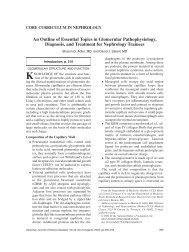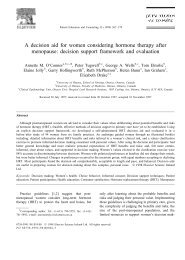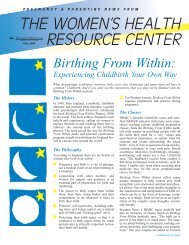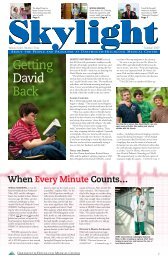Surgery and Healing in the Developing World - Dartmouth-Hitchcock
Surgery and Healing in the Developing World - Dartmouth-Hitchcock
Surgery and Healing in the Developing World - Dartmouth-Hitchcock
Create successful ePaper yourself
Turn your PDF publications into a flip-book with our unique Google optimized e-Paper software.
27<br />
278 <strong>Surgery</strong> <strong>and</strong> <strong>Heal<strong>in</strong>g</strong> <strong>in</strong> <strong>the</strong> Develop<strong>in</strong>g <strong>World</strong><br />
of <strong>the</strong> late presentation of illness <strong>and</strong> <strong>the</strong> lack of hygiene <strong>and</strong> sanitation that may<br />
contribute to communicable disease. It is fatuous to suggest that economic development<br />
will resolve <strong>the</strong> differential <strong>in</strong> <strong>the</strong> morbidity of tropical populations (for which<br />
a contrary witness is seen <strong>in</strong> many urban <strong>in</strong>dustrialized environments); but it is also<br />
a Pollyanna cruelty to await economic development before proceed<strong>in</strong>g with methods<br />
of mitigat<strong>in</strong>g surgical tropical disease. There are methods of deal<strong>in</strong>g with shortages<br />
of skilled labor <strong>and</strong> materials that circumvent through <strong>in</strong>genuity what may be<br />
lack<strong>in</strong>g <strong>in</strong> o<strong>the</strong>r resources, 5 <strong>and</strong> oftentimes <strong>the</strong>se improvisations are <strong>the</strong> k<strong>in</strong>ds of<br />
surgical tricks that are a lesson that <strong>the</strong> First <strong>World</strong> visitors must learn from <strong>the</strong><br />
tropical healthcare workers: “How to h<strong>and</strong>le larger volumes of sicker patients with<br />
fewer resources” is a postgraduate course many of us need to study from those veterans<br />
of longer experience <strong>in</strong> mak<strong>in</strong>g do with what <strong>the</strong>y have.<br />
The first pitfall to be avoided here is <strong>the</strong> despondency that whatever can be<br />
offered <strong>in</strong> face of such overwhelm<strong>in</strong>g need would be <strong>in</strong>adequate, so why even bo<strong>the</strong>r<br />
to try? The s<strong>in</strong>gle requirement for work<strong>in</strong>g <strong>in</strong> <strong>the</strong> develop<strong>in</strong>g world is a nearly <strong>in</strong>f<strong>in</strong>ite<br />
threshold for frustration—with patients’ problems, with <strong>the</strong> limitations of staff,<br />
with <strong>the</strong> <strong>in</strong>adequacy of resources by <strong>the</strong> st<strong>and</strong>ards of <strong>the</strong> First <strong>World</strong> redundancy<br />
many of us had become quite comfortable with <strong>in</strong> o<strong>the</strong>r sett<strong>in</strong>gs. In fact, almost any<br />
contribution made <strong>in</strong> several small ways toward improvement gives very notable<br />
<strong>and</strong> immediate rewards. As a surgical colleague would often say <strong>in</strong> such circumstances,<br />
“You cannot fall off <strong>the</strong> floor,” <strong>and</strong> <strong>the</strong> encouragement to start is one of <strong>the</strong><br />
best contributions that can be offered from a colleague who has been <strong>the</strong>re before.<br />
A second pitfall (which one source 6 calls <strong>the</strong> “commonest pitfall <strong>in</strong> diagnosis”) is<br />
<strong>the</strong> assumption that an immigrant must import his diseases with him. With only a<br />
few notable exceptions, most Western diseases flourish <strong>in</strong> <strong>the</strong> tropics, but <strong>the</strong>ir presentation<br />
may be modified by environmental <strong>and</strong> o<strong>the</strong>r factors. Common conditions<br />
occur commonly, although <strong>the</strong>y may have an uncommon appearance <strong>in</strong> an<br />
unfamiliar sett<strong>in</strong>g.<br />
Priorities are rearranged <strong>in</strong> <strong>the</strong> tropical sett<strong>in</strong>g, where a period of experience can<br />
“reset” <strong>the</strong> pattern recognition that is such a consistent feature of physician behavior<br />
as efficiency accumulates with experience. When <strong>the</strong> author first plunged <strong>in</strong>to <strong>the</strong><br />
exhilarat<strong>in</strong>g experience of tropical medic<strong>in</strong>e <strong>and</strong> surgery <strong>in</strong> <strong>the</strong> develop<strong>in</strong>g world<br />
over three decades ago, 7 <strong>the</strong> carefully learned reflexive behavior had to be relearned<br />
<strong>in</strong> <strong>the</strong> sett<strong>in</strong>g <strong>in</strong> which <strong>the</strong>se patterns were now quite different. For example, right<br />
lower quadrant pa<strong>in</strong> <strong>in</strong> a young male has a ra<strong>the</strong>r circumscribed differential diagnosis<br />
<strong>in</strong> <strong>the</strong> First <strong>World</strong> sett<strong>in</strong>g, whereas it would nearly <strong>in</strong>variably mean someth<strong>in</strong>g<br />
else <strong>in</strong> <strong>the</strong> Nigerian bush hospital sett<strong>in</strong>g where I found myself shortly after I had<br />
learned <strong>the</strong> pattern revolved around appendicitis where I had been only shortly<br />
before <strong>in</strong> a US University hospital. I made lists of <strong>the</strong> rare <strong>and</strong> exotic diseases I<br />
would see <strong>and</strong> added <strong>the</strong>m to my cl<strong>in</strong>ical collection. But, I shortly picked up ano<strong>the</strong>r,<br />
<strong>and</strong> possibly more valuable habit—I listed <strong>in</strong> my notepad <strong>the</strong> very common<br />
conditions afflict<strong>in</strong>g patients that filled over two-thirds of <strong>the</strong> <strong>in</strong>patient beds <strong>and</strong><br />
three fourths of <strong>the</strong> outpatient office visits that I was not see<strong>in</strong>g <strong>in</strong> <strong>the</strong> tropical sett<strong>in</strong>g.<br />
These conditions were not subtle <strong>and</strong> <strong>the</strong>refore easy to overlook, or not seen<br />
because <strong>the</strong>y required some special diagnostic test<strong>in</strong>g that was absent, nor overwhelmed<br />
by o<strong>the</strong>r problems that prevented <strong>the</strong>m from ever develop<strong>in</strong>g, because of,<br />
for example, foreshortened lifespan. These conditions were simply absent. In <strong>the</strong><br />
example of appendicitis, <strong>the</strong>re was one patient who had once developed appendici-










